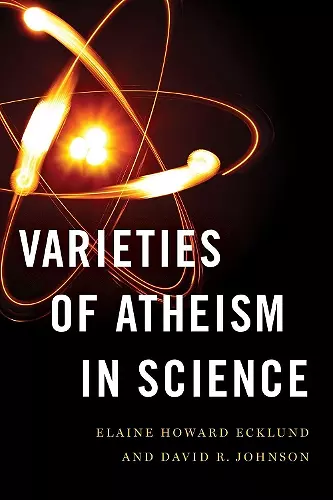Varieties of Atheism in Science
David R Johnson author Elaine Howard Ecklund author
Format:Hardback
Publisher:Oxford University Press Inc
Published:12th Oct '21
Currently unavailable, and unfortunately no date known when it will be back

A significant number of Americans view atheists as immoral elitists, aloof and unconcerned with the common good, and they view science and scientists as responsible. Thanks in large part to the prominence and influence of New Atheists such as Richard Dawkins, Sam Harris, Daniel Dennett, and Christopher Hitchens, New Atheism has claimed the pulpit of secularity in Western society. New Atheists have given voice to marginalized nonreligious individuals and underscored the importance of science in society. They have also advanced a derisive view of religion and forcefully argued that science and religion are intrinsically in conflict. Many in the public around the globe think that all scientists are atheists and that all atheist scientists are New Atheists, militantly against religion and religious people. But what do everyday atheist scientists actually think about religion? Drawing on a survey of 1,293 atheist scientists in the U.S. and U.K., and 81 in-depth interviews, this book explains the pathways that led to atheism among scientists, the diverse views of religion they hold, their perspectives on the limits to what science can explain, and their views of meaning and morality. The findings reveal a vast gulf between the rhetoric of New Atheism in the public sphere and the reality of atheism in science. The story of the varieties of atheism in science is consequential for both scientific and religious communities and points to tools for dialogue between these seemingly disparate groups.
This book is a warm, empirically well founded and welcome argument to thoroughly revise the rhetorical and outdated paradigm of the new atheists about the relationship between faith and science. * R. Peels, Theologia Reformata *
The book is well worth reading by anyone interested in what real people think about science and religion. Moreover, it readily deserves a place in required reading lists of, for example, undergraduate science and-religion courses. * Mike Brownnutt, Associate Director of the Faith and Science Collaborative Research Forum at the University of Hong Kong, Science and Christian Belief *
The authors discuss atheist scientists' views on religion, morality, and the limits of scientific questioning and conclude that scientists who are atheists and scientists who are believers may have much more in common than the new atheist dialectic on the issue would lead one to believe. A good resource for those interested in the intersection of science and religion. Summing Up: Recommended. Upper-division undergraduates through faculty. * A. Jaeger, CHOICE *
The book's premise is that "New Atheist" science—loud, brash, and openly antagonistic and disdainful of religion misunderstands the realities of atheist scientists. The book masterfully demonstrates that this is indeed the case: most atheist scientists are not hostile to religion, and some even embrace it in myriad forms. * Shiri Noy, Sociology of Religion *
The research is meticulous and appendices provide important details, but the book itself is accessible to general audiences, and would be appropriate for an undergraduate audience in classes on religion, science, and/or morality, in addition to graduate classes on these topics. * Sociology of Religion *
Ecklund and Johnson reorient our thinking about atheist scientists. New Atheist scientists have framed the relationship between science and religion, the image of the atheist scientist. This book shows that atheist scientists are less hostile and more conciliatory towards religion. Ecklund and Johnson's work will increase dialogue between religious communities and atheist scientists, leading to greater diversity in the scientific workforce. In our polarizing times, their book is a must-read. * Nichole R. Phillips, Emory University *
Drawing on extensive survey research and interviews with scientists, this book is a valuable corrective to the New Atheist literature inspired by Richard Dawkins, Sam Harris, and Daniel Dennett. I was especially impressed with the authors' attention to how the gulf between religion and science might be bridged to encourage more religiously-inclined students to consider careers in science and more scientists to be amenable to that possibility. * Robert Wuthnow, Princeton University *
This book shows us the importance of looking at the relationship between science and religion from the ground up, by considering what non-believing scientists actually think. Their attitudes turn out to be quite varied, but through analysis and classification Ecklund and Johnson illuminate the striking hues of a picture too often presented in black and white. * David Voas, University College London *
Science is strengthened when people from diverse perspectives and backgrounds can participate fully in the quest for understanding the natural world. The careful research of this book brings to light the reality that most scientists who identify as atheist are not hostile to religion or religious believers, which is good news since many persons from groups currently underrepresented in science also identify religious faith as an important part of their lives. The authors encourage relationships and bridges between scientists and people of faith, which we would be wise to build. * Jennifer Wiseman, American Association for the Advancement of Science *
The intention of the book - based on a differentiated, partly faith-friendly self-understanding of scientists, to plausibilize the dialogue of science with religious communities in order to increase social unity - remains foreign to European readers. However, the perspective and intention of this book [...] offer a very informative insight into the Anglo-American social structure and its challenges. * Theologische Revue 119 *
Ecklund and Johnson have a put together a fine work of scholarship showing that, if a scientist identifies as an atheist or a skeptic of Christianity or other religions, they rarely resemble the antitheism of Richard Dawkins, Lawrence Krauss, and their followers. * Glenn B. Siniscalchi, Horizons: The Journal of the College Theology Society *
ISBN: 9780197539163
Dimensions: 147mm x 213mm x 25mm
Weight: 363g
224 pages